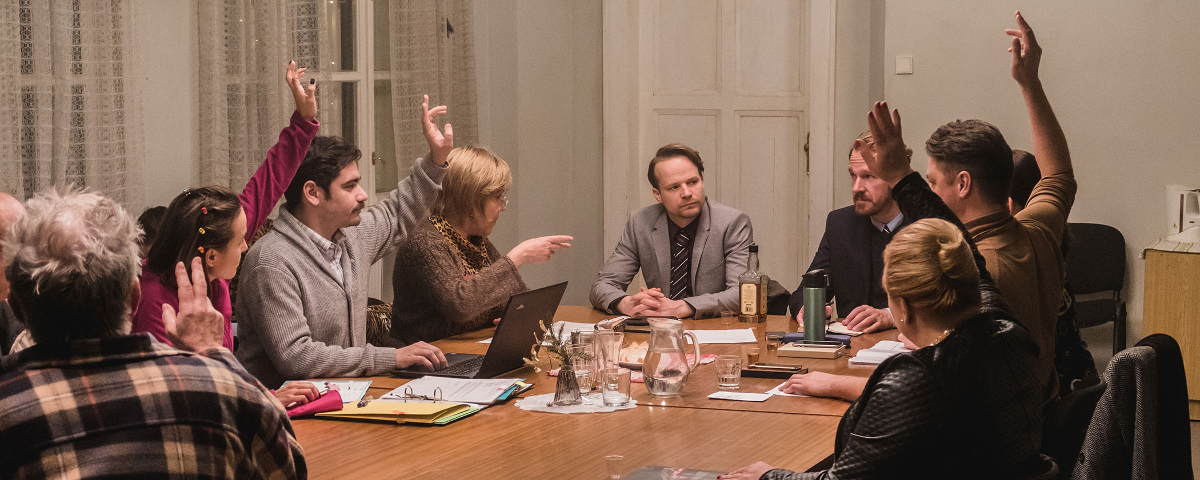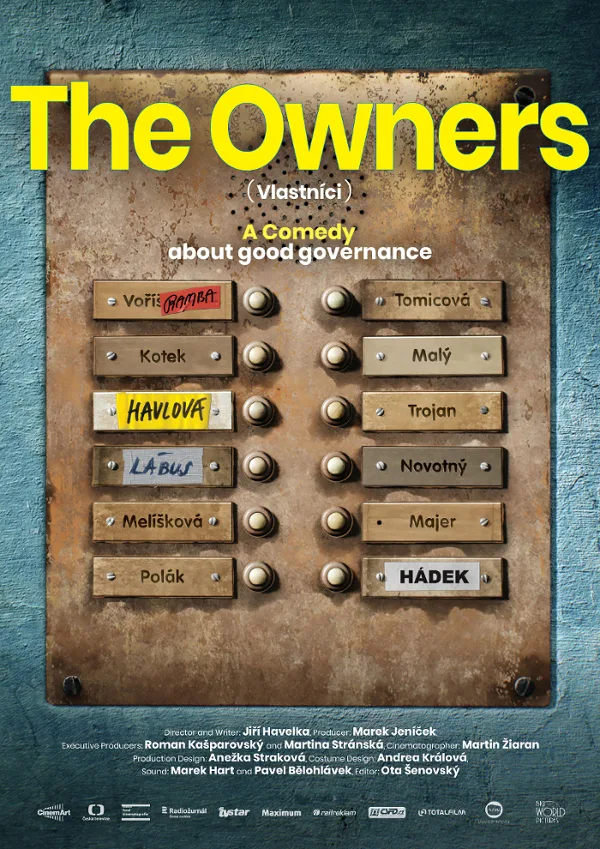Sayre’s law says, “In any dispute, the intensity of feeling is inversely proportional to the value of the issues at stake.” In “The Owners,” a film from the Czech Republic that takes place almost entirely at a meeting of a building’s co-op members, the intensity of feeling is always high, whether the topic at hand is as minor as if there needs to be a vote about who will take the notes or as literally fundamental as approval of critical maintenance of the building’s roof and pipes. Inside the co-op’s meeting room are scuffles, bigoted accusations, tears, and people who walk out in disgust or fury, all in a tone of the darkest satire, based on a play by the film’s writer/director, Jirí Havelka.
Over the opening credits, we see a family hurrying to get ready. In contrast to the chaos in their apartment, the soundtrack features an elegant classical piece by Czech composer Jan Dismas Zelenka. Its title translates as “Under the Olive Tree of Peace and the Palm Tree of Virtue the Crown of Bohemia Splendidly Shines Before the Whole World: Melodrama.” That’s the only peace or virtue we’ll be getting in this film.
The chair of the meeting is Mrs. Zahrádková (Tereza Ramba), who is very organized and very determined, wearing a brightly colored sweater and little plastic barrettes in her hair that emphasize her youth compared to most of the other members of the homeowners’ association. She wants her husband, Mr. Zahrádka (Vojtech Kotek), to keep the minutes, but Mrs. Roubíčková (Klára Melíšková), acting as a combination parliamentarian/cop, insists on a vote to approve, even voting on whether there should be voting, with several layers of approval and verification for everything. Mrs. Zahrádková starts to lose patience because she is eager to get to her ambitious agenda. But the other attendees have other views if some seem unclear on the basic concepts.
Mr. Švec (David Novotný) is the son of one of the owners, but his mother is in the hospital, so he is there to cast her votes. Mrs. Roubíčková insists on seeing his power of attorney. He passes her the paper. She notes that the only signature on it is his; what it needs is his mother’s authorization. He obligingly takes it back, scribbles on the paper, and hands it back. “Even if I closed my eyes and did not see you signing it for your mother,” she sniffs, “you cannot sign it ‘Mom.’”
The snobbish Mrs. Procházková (Pavla Tomicová) is accompanied by her “representative,” Mr. Novák (Ondřej Malý). She does not live in her apartment; she rents it to six Ghanaian medical students. Mr. Nitranský (Andrej Polák) does not let the homophobic slurs from some of his neighbors interfere with his commitment to making urgently needed repairs to the building’s common areas. Mr. Kubát (Jiří Lábus) longs for the good old days of communism. Another attendee says nothing and just reads his book. And there are two sets of newcomers, a newlywed couple who are mostly silent and the affable Čermáks, fraternal twins (Kryštof Hádek, Stanislav Majer), who have just inherited the apartment from their father.
As the conflicts move from the annoying to the existential, the one-room setting is appropriately depressing and claustrophobia-inducing. Anyone who has ever suffered through efforts to try to achieve consensus might want to consider this a trigger warning. Some of the film’s satire relies too heavily on repetition, with Mr. Kubát insisting that everything used to be better under the Soviets and Mr. Novák responding to every issue by handing out his business card, explaining that whatever the problem is, from plumbing to pets, he has a “small company” that can fix it. The cutaways that show the reality of the situations being debated are superfluous.
But as the frustration of the group gets more intense and the issues get more controversial (and, unsurprisingly, expensive), it becomes clear that the film is making a larger point about the inability of governments, citizens, and human beings to overcome what Garrett Hardin called The Tragedy of the Commons: How do we find a way to do what is best for the group in the long term instead of what is best in the short term for us as individuals? How do we care as much about the land, water, and air we all share as about our own homes? How do we act in time to prevent the collapse of our literal foundations? All we can do is hope we find a better way than this group.
Now playing in select theaters.




















